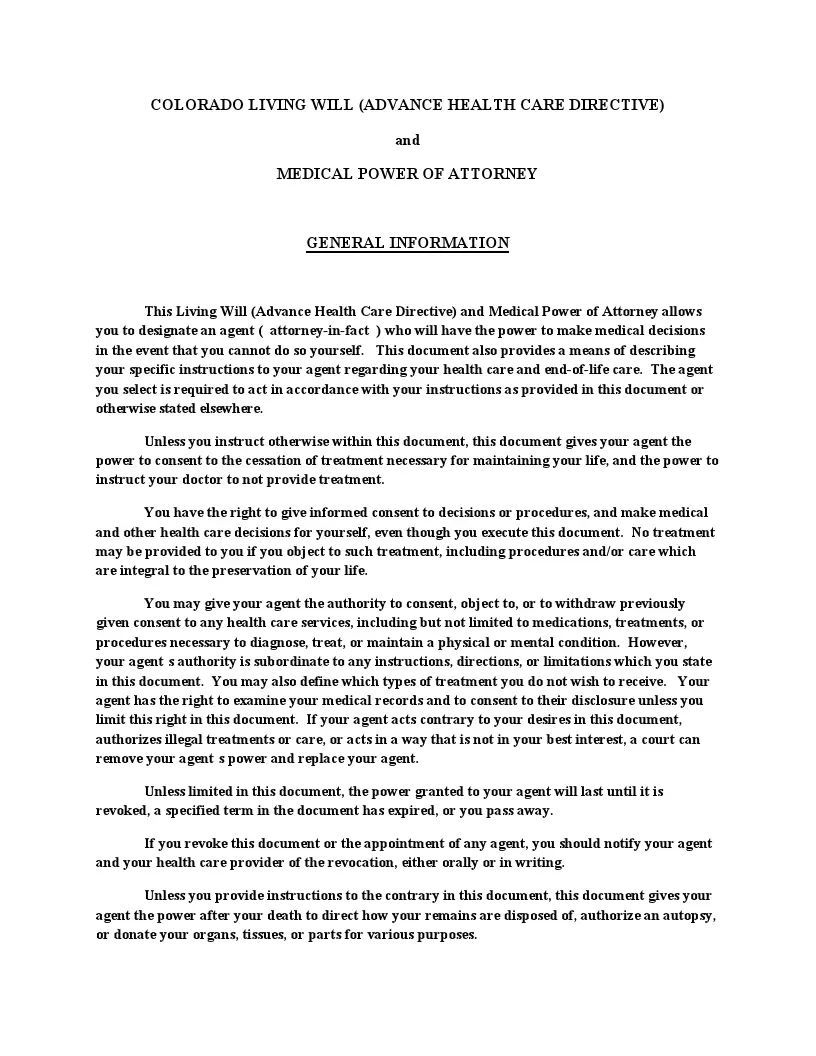Free Colorado Living Will Form
In Colorado, a Living Will form or the Advance Directive for Surgical or Medical Treatment is a voluntary written document that allows adult residents of eighteen years old or older to specify their wishes about medical and mental health care.
If a person (or a declarant, or a principle) is dealing with life-threatening conditions including a persistent vegetative state, incurable forms of a disease, or irreversible conditions and is no longer able to render decisions, the Colorado Living Will empowers an appointed healthcare agent to speak on the declarant’s behalf.
If one is intent upon creating a Colorado Living Will, one should consider the following documents. The forms below cover similar aspects with a few differences.
- Free Colorado Medical Power of Attorney empowers an elected person to make medical decisions.
- Advance Medical Directive is a comprehensive, detailed legal form that particularizes terms of both a Living Will and Medical Power of Attorney.
- Colorado Power of Attorney is a legal document that specifies the financial matters.
Signing Requirements and Laws
Following Colorado Revised Statutes §15-18-104, only adults at least 18 years old are allowed to create a Living Will document. It becomes applicable when a person’s physician verifies that the principle is no longer competent to render decisions. A verification of another qualified physician is required.
The Colorado state law §15-18-103 defines decisional capacity as the facility to provide informed agreement to or refusal of medical treatment. The principle must be able to render medical decisions.
A declarant will require the signatures of two competent witnesses to authorize the document, according to section 6 of Colorado state law §15-18-104.
To maintain the actions specified in the free living will form, a principal may appoint an agent to take care of medical decisions in case the principal becomes incapacitated. The agent obtains exclusive powers to control healthcare issues. This person will speak on behalf of the principal under stressful circumstances, so we highly recommend choosing one’s representative wisely and specify the acceptable ways of treatment and medical wishes.
The Colorado Advance Medical Directive document creates a list of preferences regarding one’s treatment and includes:
- Life-sustaining procedure
- Organ donation
- End-of-life planning
- Election of a healthcare agent or a healthcare proxy
- Treatment methods, including hydration, artificial ventilation, nutrition, pain relief, and resuscitation.
If the principal changes his or her mind due to life circumstances, they can cancel the document at any moment.
- A person can revoke the Living Will orally or in writing. Acts of destroying the document, including burning, tearing, and canceling, are valid, specified in Article 18 of title 15-18-109 of Colorado state law.
- The Living Will will also find no force in case the declarant is pregnant with a viable fetus.
After all terms and conditions are satisfied, one can proceed to create the Living Will document.
Colorado Living Will Form Details
| Document Name | Colorado Living Will Form |
| State Form Name | Colorado Advance Directive for Surgical / Medical Treatment |
| Signing Requirements | Two Witnesses |
| Validity Requirements | Section 15-18-104(5) |
| Powers Limitation | Sections 15-18-104(1) and 15-18-103(10) |
| Avg. Time to Fill Out | 13 minutes |
| # of Fillable Fields | 48 |
| Available Formats | Adobe PDF; Microsoft Word |
| State Laws: Colorado Revised Statutes, Sections 15-18-101 to 15-18-113 | |
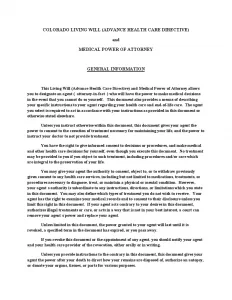
Steps to Fill Out the Form
Creating a Colorado Living Will document will require accomplishing the following steps:
1. Download the Living Will Form
To fill out the Colorado Living Will form efficiently and correctly, we recommend using the Online Form Building Software we provide on our website.
2. Specify the Declarant’s Information
Enter full name and address, including ZIP code. You should specify if you are planning to use artificial nourishment and choose life-sustaining treatment measures, including medication, drugs, medical gear, and manipulations. Below you’ll find the most relevant treatments:
- Artificial ventilation to support respiratory status
- Resuscitation, including cardiopulmonary resuscitation (CPR) or a defibrillator
- Artificial nourishing
- Dialysis to support correct functioning of kidneys
- Antibiotics and pain relief aid
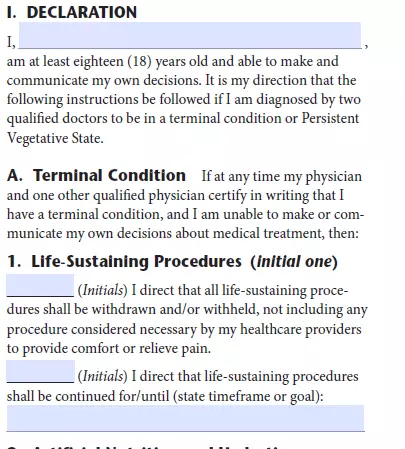
3. Define Comfort and Pain Relief Measures
Even if you decide to refuse life-sustaining treatment, you are empowered to keep treatment that includes medication that can reduce pain and sustain comfort.
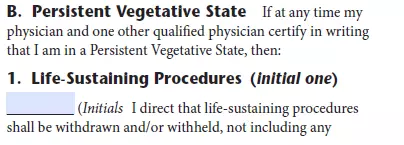
4. Appoint a Proxy
Elect a person (or an agent, an attorney, or a proxy) to make decisions on your behalf and provide directions regarding life-sustaining treatments if you become incapacitated. According to Colorado law and Medical Durable Power of Attorney section, you may elect a family member, a friend, or a trustee, a competent adult of at least 18 years old, capable of rendering decisions under stressful circumstances. The agent shares the values and respects the principal’s wishes.
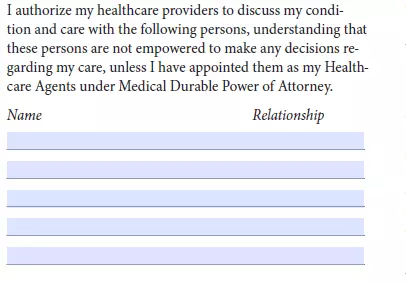
5. Define General Powers of the Agent
Define what efficient decisions your attorney can make, including settlements on healthcare, life-sustaining treatment, and end-of-life preferences.
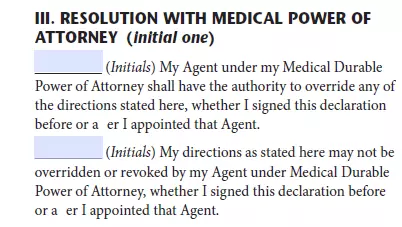
6. Ensure Witness Signatures and Notarization
According to Colorado Medical Treatment Decision Act, §15-18-106, the Living Will document must be signed by a declarant and two adult witnesses. All participants must be present personally during the procedure. The witnesses fill out their names, addresses, and phone numbers. The witnesses must not be one of the specifies persons below:
- The attending physician or any other physician
- He or she mustn’t work at the health care facility in which the principal is a patient
- A person related by blood, marriage, or adoption
- A person authorized to inherit any part of the principal’s estate upon his or her death
It is advisable to certify the document by a notary public. The Living Will includes the corresponding part. However, section 106 (2) of Article 18 of title 15, Colorado Revised Statutes, defines that the absence of notarization won’t affect the document’s validity.
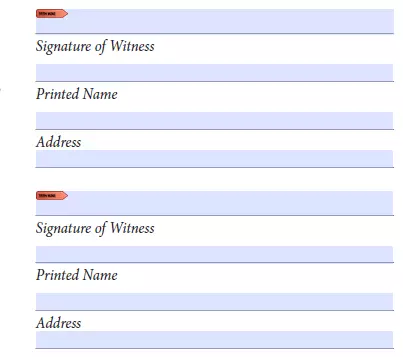
7. Distribute Copies
After completing and validating your Living Will document, make sure to distribute copies to your physician, your lawyer, family members, and friends if needed. File Living Will with your Testament and keep the documents safe.

We offer a multitude of major Colorado templates to anybody seeking simplicity when handling various agreements, contracts, and other paperwork in the state.

